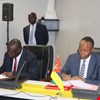
/ Southern Africa
GWP and Partners launch the ChangeMakers Award
On 22 March 2020 (World Water Day) GWP and Partners launched the ChangeMakers Award - a global competition that celebrates transformative changes towards a water secure world.

/ Southern Africa
GWPSA Strategy 2020-2025 to focus on Mobilizing Investments for A Water Secure Southern Africa
The Global Water Partnership Southern Africa (GWPSA) will be launching its Strategy for 2020 – 2025 themed “Mobilizing Investments for A Water Secure Southern Africa”, to its partners in Pretoria, South Africa. The Strategy, to be launched at a meeting to mobilize investments for a water secure southern African region, will guide how GWPSA will focus its work between 2020 and 2025 in line with the GWPO Global Strategy.

/ Southern Africa
Mozambique and Zimbabwe sign Agreement to enhance water cooperation in the Buzi Watercourse
The governments of Mozambique and Zimbabwe have signed an Agreement on Co-operation on the Development, Management and Sustainable Utilization of the Water Resources of the Buzi Watercourse. The Agreement signed on 29th July, in Mutare, Zimbabwe by the ministers responsible for water will enhance cooperation between the two countries and the region as a whole

/ Southern Africa
Pan-Africa Training on International Water Law and Water Governance - Improved Transboundary Water Investment in Africa
GWP is organising a training on Water Governance and International Water Law (IWL) in Africa together with partner organisations. The training takes place in Kampala, Uganda, 11-14 November 2019. The deadline to apply is 6 September

/ Southern Africa
Welcome to the public consultation of GWP’s Draft Strategy 2020-2025!
We invite you to read the draft strategy and share your thoughts. Comments will be considered and incorporated into the final version of the strategy document, which will be launched in July 2019. The consultation period runs from 6-20 May 2019.

/ Southern Africa
SADC convenes Gender Clinic on Project Preparation and Financing
On 25 March 2019, the Southern African Development Community (SADC) convened a Gender Mainstreaming in the Water Sector Project Preparation and Financing Clinic in Johannesburg, South Africa. The workshop, organised with support from the Global Water Partnership Southern Africa (GWPSA), brought together financiers, project developers/promoters, project implementers, gender focal points and gender machinery from the 16 SADC countries to discuss practical issues with regards to gender mainstreaming during project preparation and mobilising financing processes.



/ Southern Africa
Gender issues should not be taken lightly – warns SADC
Gender, like many other sectors, looks so easy on the surface, but so deep when you unpack and implement, SADC ‘s Dumisani Mndzebele told a gender mainstreaming meeting in Malawi.

/ Southern Africa
Gender Responsive Budgeting critical in identifying gaps in policies – SADC
Gender mainstreaming is about identifying gender gaps and making the concerns and priorities of women’s, men’s, girls’ and boys’ integral to the design, implementation, monitoring and evaluation of policies and programmes so that developmental benefits are relevant, and are shared equally.